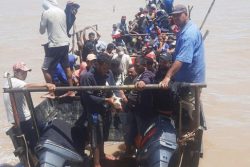The seemingly entrenched ‘divide’ between North and South that manifests itself, mostly, in a rich/poor divide and the failed efforts that have been made over decades by the South to narrow the gap, has once again been shoved to the front burner by Hurricane Beryl, more accurately, by the physical state in which the hurricane left large swathes of the region. Not only are we unable to provide a timeline for its remedy, beyond that, the circumstances take no account of what one might call the developmental deficit that was derived from Beryl’s rampage and which, going forward, is likely to become an impediment to the long-term development of the affected countries.
Here, it has to be said that remedy, if indeed it is an immediate or even medium-term consideration, will take the kind of time that cannot be estimated. What we are finding out, as time goes by, is that the phenomenon named Beryl went way beyond strong winds that laid waste to structures and uprooted trees. The damage in some of the affected smaller countries also applies to critical long-term requisites, including that phenomenon we loosely describe as development. The reality is that some of the worst-affected Caribbean islands will be destined to play an exacting game of ‘catch-up’ for the foreseeable future, and, the simple truth is that the resources associated with rebuilding and recovery will more than likely not be placed at their disposal at a pace that removes the sacrifices necessary to be made in the intervening period. Here, the affected countries face the imminent danger of slipping even further behind the unaffected areas of the international community. Simply put, the gap between rich and poor will continue to deepen.
To talk of (as the slang goes) simply ‘sucking it up’ and moving on is to seek to evade, completely, what, in some instances, has been the reality of Beryl’s destructive onslaught. In some of the affected countries, significant parts of the populations have been scattered to the winds, left without food or shelter, while their respective governments, themselves, are in some instances, sorely limited in capacity to effect meaningful remedial action. If the recent meeting of CARICOM Heads of Government in Grenada is anything to go by it would appear that the countries of the Caribbean are not – in the instance of the damage inflicted by Beryl – simply prepared to ‘suck it up’ and move on. A report that is the basis of a story published elsewhere in this issue of the Stabroek Business not only offers clues to the (seeming) collective disposition of CARICOM member countries to Beryl’s tirade, indeed, it appears, first, CARICOM is contemplating the assembling of its ‘diplomatic forces’ to execute a demarche on the rich countries of the North, advancing the argument that the increasingly destructive global weather patterns (global warming) that arise out of the amount of greenhouse gases in the atmosphere result, overwhelmingly, from the unceasing pursuit of accelerated industrialization by the countries of the North.
Not many moons ago, here in the Caribbean, the term global warming was discussed, in large measure, as a detached environmental phenomenon. The impact of present-day inhospitable weather patterns in the region are increasingly being seen, not just as an environmental phenomenon, but as a factor reinforcing the rich/poor divide. As the consequences grew increasingly stark, global warming came to be perceived as a consequence of the indulgences of the rich returning to haunt/punish the poor. It is to this place, it seems, that the recent rampaging of Hurricane Beryl has brought us. At the recent post-Beryl gathering of CARICOM Heads in Grenada, the forum certainly appeared to strike an (to say the least) assertive posture on what it regarded as arguably the most disturbing dimension to the wider rich/poor debate, the underpinning argument being that in several respects the wealth of rich nations was obtained at the expense of the poorer ones. The CARICOM heads appeared to be saying that the climate change-related ‘indulgences’ of rich countries have a direct link to the increasing devastation being inflicted on the Caribbean resulting from what is now believed to be the incrementally ‘ramped up’ hostile weather phenomenon like Hurricane Beryl.
In Grenada, it appeared that CARICOM Heads had simply ‘cut loose,’ seemingly asserting that the threat posed by climate change could no longer be seen as some kind of occasional oddity. It is reflective of an incrementally worsening dimension to climate change that is directly linked to aspects of the behaviour of rich countries. What Beryl left behind in her wake makes the point that simply ‘soaking up’ the periodic climate change-related weather rampages will not ‘cut it’ as far as the growth and development of the countries of the Caribbean are concerned. The solution reposes in possibly protracted discourses at the highest levels underpinned by the reality that where undertakings in the diplomatic realm are not buttressed by measured practical and workable action it is the very existence of large swathes of the Caribbean that are at stake. In a nutshell, CARICOM has a vested interest in moving the global climate change discourse beyond the realm of ‘jaw jaw.’







